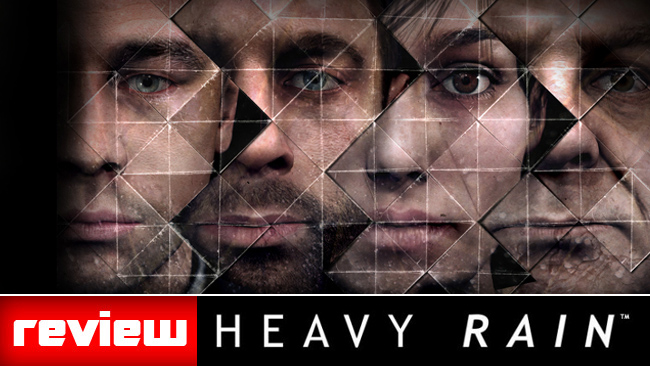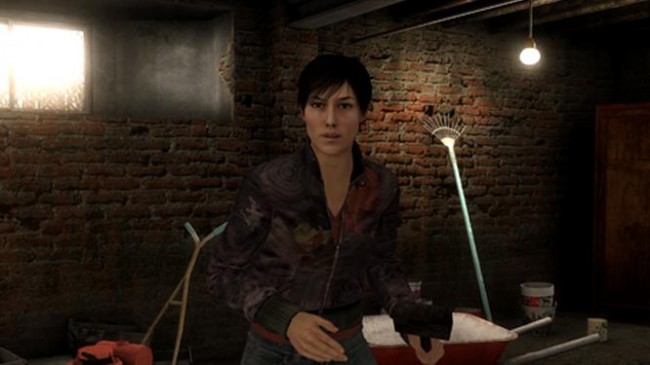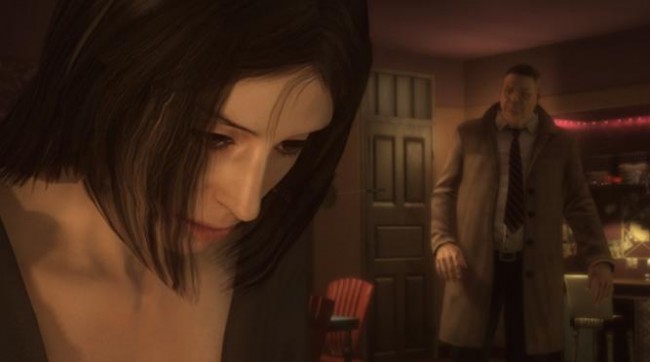
The developers at Quantic Dream provided me with one of the more interesting games that I’ve played in this generation of consoles. Heavy Rain is like eating your first tasty slice of watermelon for the year; it’s a new and refreshing experience. Much like Flower, I can honestly say that I haven’t played anything quite like Heavy Rain before. However, this piece of watermelon happens to be riddled with seeds. You can spit them out, swallow them, or throw the whole slice away.
Before I move on, I ask my fellow gamers, “How far are you willing to go to enrich your gaming experiences this year?”
Heavy Rain follows the paths of Ethan Mars, Norman Jayden, Scott Shelby, and Madison Paige, as they try to solve the mystery of the Origami Killer, a serial killer who targets young boys. Heavy Rain is best described as a psychological thriller. I often felt that playing through certain portions of the game took an emotional toll me. The developers at Quantic Dream really excelled at bringing about feelings of fear, concern, and tension within me; they should really be proud of that.
There were times when I turned on my PS3 and actually dreaded playing Heavy Rain as it booted up, but its plot was decent enough to get me to push forward in the hopes of finding out the identity of the Origami Killer. But the key word in the previous line is “decent.” I’m by no means a movie or book critic, but I didn’t find the story to be particularly deep. It contained a series of events that told a shallow story. It’s in the game’s tagline: how far would you go to save the one you love? In terms of the in-game decisions you make, it’s mostly between “do this” or “do that” and “do” or “don’t do.” Heavy Rain excelled in getting me to react emotionally to each individual event.
Unfortunately, the game’s story is not without its plot holes — and there are a lot of them. In the interest of keeping this review spoiler-free, I can’t really discuss them here in detail. I will say that there are some things that may require you to suspend your belief.
Aristotle had once said, “The whole is more than the sum of its parts.” I think the opposite is true for Heavy Rain. I found more value in each individual scene because of the way they made me feel as opposed to the story that each scene told together as a whole. The semi-deep story and plot holes do sully this title a little bit, but Heavy Rain got me squirming in my seat. I felt nervous; I felt tense; I felt suspense. Heavy Rain really had its way with my emotions and mood, shaping both like pieces of clay. This is more than I can say for most games that I’ve played in the past few years.
The things that make Heavy Rain unique are best described in terms of its gameplay — which (interestingly enough) is comprised of mechanics that are not so unique. The game has two main mechanics: the quick-time event sequences and the decision making (in dialogue and actions). Heavy Rain is often described as an interactive movie, and that’s what it plays like. The cut scenes that you see depend on how well you’ve completed the previous QTE sequences, the actions you’ve decided to take, and the things you’ve said to people.
One of the main things you’ll notice while playing through the Heavy Rain demo is that there are a lot of QTEs — and the full game is no different. At this time, QTEs may be the best way to pull off a video game that’s meant to be an interactive movie. However, I sometimes felt — and I hope this makes sense — that it suffered from first being a film that was made into a game as opposed to a game that was made into a movie. There were some QTE sequences that felt inane (such as making eggs for someone). Unfortunately, if you were to take all of these sequences out, you remove a lot of the “game” from Heavy Rain. I may be alone in feeling this way, and I’m not quite sure how I would have gone about fixing this issue.
Unlike other video games, the story does not end if you die; the story moves on with the remaining characters. I ended up liking the characters enough to feel genuine concern for their well-being. The decisions you make will get people killed, thus changing everyone’s experience with Heavy Rain. As I peruse YouTube to watch the many different endings in the game, I can’t help but feel appreciative of its non-linear nature. The choices you make matter, just like in a Mass Effect game. I thought it was really interesting to see this achieved in a non-RPG title.
Heavy Rain is a really good looking game — really good looking. The high production value is there. Unfortunately, it doesn’t sound as good as it looks. Some of the voice acting is really atrocious. Moreover, the worst voice acting is found in some of the main characters (I’m looking at you, Norman Jayden-guy). There’s not much more to say about this. Although highly distracting, I was able to get past this as I got through the game. I’d be lying to you if I told you that I didn’t miss any lines because I took time to make fun of the way everybody in the game pronounced the word “origami.” By the way, almost everyone in Heavy Rain mispronounces “origami.”
I think that Heavy Rain is a really important game to play this year. In this hi-def era of gaming, it really shows us what games can be capable of. If you have a PS3 and like sampling interesting games, you should go play it. At 10-12 hours per play-through, this title is an easy recommendation for a rental. However, it’s semi-deep (much like game reviews that have the gall to quote Aristotle) story, plot holes, and voice acting are things to be wary of. It is like eating a seed-riddled watermelon. I spat these seeds out, and I had a lot of cleaning up to do afterward in terms of dwelling on its inconsistencies. But, I don’t regret it (by the way, if you don’t like watermelon, you’re a monster). It was a tasty gaming experience, and I appreciate the suspense that each individual scene created. I was really skeptical walking into this game mostly due to the fact that I’m not very big on QTEs. But after playing Heavy Rain, I’m looking forward to what cinematic gaming has in store for us in the future.



No Comments